Review: Numenera the Role-Playing Game from Monte Cook
Numenera is Monte Cook’s latest role-playing game he successfully Kickstarted earlier this year. I did not support the Kickstarter but its success drove my curiosity enough to play a session at 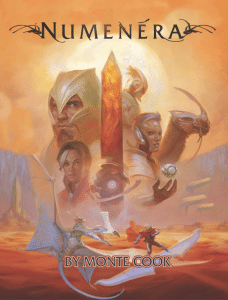
Numenera at its core is a fantasy/sci-fi RPG set on Earth in the distant future (a billion years!) where eight civilizations rose and fell millions of years before the PC’s age. Very little knowledge survives from these previous civilizations, but their works both great and small are everywhere. Super-science so advanced it is indistinguishable from magic supports floating citadels, genetically engineered beasts roam the world and occasionally extra-dimensional portals offer opportunities for exploration…or a quick death. Most of all, no one understands it. People accept it as the world they live in and make use of these esoteric technologies, but it is like a caveman using a steel knife. Our caveman cannot fathom how the steel is made, only that it is a good tool. All this technology and legacies from other civilizations is collectively known as “numenera.”
Players choose between three types of characters glaives (fighters), nanos (casters) and jacks (jack-of-all-trade skill monsters). Players receive a standard set of stats for each character type and then spend some points to customize their PC’s stats and background. For example, my PC turned on an ancient device and permanently covered himself in a layer of frost as part of his back story. It gives an armor bonus, but it actually just looks cool. Literally.
Each PC has three main stats, Might, Speed and Intellect. These scores decide how fast or smart you are and serve as pools of expendable points to modify difficulty rolls. They also function as hit points for different stats, so if you get hit by a psionic blast you will lose Intellect points. This reduces your ability to spend those points to modify difficulty rolls. Hitting zero in any stat is bad.
Conflict resolution uses a single d20 roll against a difficulty number set by the GM. 1 is dead easy, 20 is superhuman. Players can use skills or burn stat points (effort) to change their roll. Beat the target number and you succeed. Roll high and potentially get a boon from the GM (extra damage, completing a task with aplomb, etc). Roll poorly and get what your miserable luck deserves…pain and suffering.
Which brings me to experience points. As with many RPGs Numenera uses experience points to advance your character. You do not receive XP for killing things. Rather you get them for either driving the story forward, preferably in a clever and entertaining way or get them when the GM wants to screw with the party. The XP mechanics are a little unusual, so bear with me.
A “GM Intrusion” is when the GM decides to use his “hand of god” to influence the game. During a fight that is going too well for the PCs, the GM decides that a PC’s weapon breaks. The GM then gives the “victim” two XP (cards when I played, but slips of paper work fine as well). Each card is worth one XP and the player must give one of the cards to another PC for any reason they wish. The players may either keep the XP for advancement, use it for a reroll or use it to stop a later “GM Intrusion.” Experience points are a valued resource, carefully guarded and deployed when needed. I love this mechanic as it actually makes XP worth something in the game besides leveling up and makes the players make hard choices about burning them or advancing their characters.
Overall, I classify Numenera as a “rule-light” RPG on par with games like Green Ronin’s “Dragon Age.” The character sheets are dead simple and there are no derived statistics. Numenera also has one of the more artistic character sheets I have ever seen.
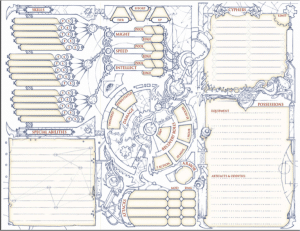
Combat is fast and easy to run with an oddity that I found quite refreshing. Players roll initiative as in many other games where the highest rolling player goes first, but in Numenera the initiative slots are available to any PC, so long as they only act once in the round. In our game I rolled a terrible initiative, but really needed to go first so another player let me take his “first” slot so I could throw the big bomb at the really awful creature that wanted to eat us. It sounds crazy, but as an initiative system it worked really well.
I enjoy the Numera system, but I think it is specifically designed to prevent or avoid many of the common complaints with Pathfinder or the 3.5 OGL system. Given Monte Cooks developed Numenera and 3.5 I found these design choices quite informative.
3.5 Problem: Gear monkeys–Players accumulate huge quantities of ever better equipment
Numenera Solution– Carrying too much Numenera tech causes illness, strange effects and you might get sucked into a personal black hole. Also most Numenera tech is one-shot use only.
3.5 Problem–Killing=XP
Numenera Solution–Only receive XP for driving the story with creativity, guile or enduring a GM Intrusion
3.5 Problem–Rules Complex at Higher Levels
Numenera Solution–Rules light all the way to maximum levels.
Beyond the game system, Numenera as a world is excellent with fleshed-out cultures ( I am a sucker for good world building), plenty of mysteries to explore and fun factions. Happily, the dominant religion is not an evil cult as a rule which removes one of my pet peeves. The “evil church” gimmick is getting old in RPGs. The core book has enough world content to keep a campaign running for years and supplements are upcoming. There is a bestiary in the core book, but it is barely adequate in my opinion. I look forward to the bestiary book in the near future.
The art and maps are all top-notch, including many maps by Christopher West that are excellent.
I wanted to take a few moments to praise Monte Cook for writing one of the best “how to GM” sections I have ever read in an RPG. He specifically takes the time to explain how language has power and how word choices greatly influence game quality. As a rhetoric major (yes, i have a degree in rhetoric.) I was impressed with Monte’s discussion about creating a sense of wonder with words in Numenera’s world. Rather than describe a flying vehicle as a “flying car” which instantly calls to my mind the DeLorean from “Back to the Future” he suggests this instead:
A large, dark mass-sharply angled and full of strange protrusions from all directions suddenly rumbles toward you through the sky, blocking the sun.
Beats “flying car,” doesn’t it?
Numenera is for those gamers looking for more story and less crunchy, pointless combat. Numenera is for gamers wanting to play bizarre characters in a stranger world. Numenera is for anyone that wants a great role-playing game.
Numenera is literally the best role-playing game effort I have played in the past 10 years. Nothing else comes close to the design elegance, world design or production values. Go and buy this game now.
Trask, The Last Tyromancer
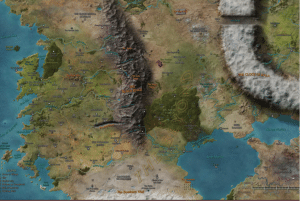
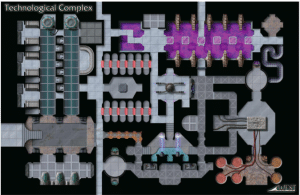
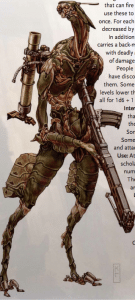

RT @LivingDice: Review: Numenera the Role-Playing Game from Monte Cook: Numenera is Monte Cook’s latest role-playing g… http://t.co/kwonV…
Review by Trask: #Numenera #RPG from @MonteCookGames: Numenera is @MonteJCook’s latest role-playing g… http://t.co/zodDmQjMLB
Glowing #numenera review. http://t.co/TBN6qfHQ8W
RT @StuartGreenwell: Review by Trask: #Numenera #RPG from @MonteCookGames: Numenera is @MonteJCook’s latest role-playing g… http://t.co/…
@LivingDice What a wonderful review. Thank you SO much for taking the time to play Numenera and give your thoughts on it.
RT @newbiedm: Glowing #numenera review. http://t.co/TBN6qfHQ8W
RT @newbiedm: Glowing #numenera review. http://t.co/TBN6qfHQ8W
Hey all you night owls! Here’s a great review to share with your friends from @LivingDice about #Numenera: http://t.co/dvPFBcvCBO
RT @newbiedm: Glowing #numenera review. http://t.co/TBN6qfHQ8W
RT @LivingDice: Review: Numenera the Role-Playing Game from Monte Cook: Numenera is Monte Cook’s latest role-playing g… http://t.co/kwonV…
Good review of Numenera. I kinda don’t want to tell anyone about this because we’ve got one Kickstarter copy left… http://t.co/47ZHi5kq43
Review: Numenera the Role-Playing Game from Monte Cook from http://t.co/9NnfE3bOGD » RPG http://t.co/aLLXl0XmvS
Tammie Webb Ryan liked this on Facebook.
@Brent_Dragoo http://t.co/YYJOuL9sb0
Great Review of SF/Fantasy RPG #Numenera by @LivingDice http://t.co/Sjy4gUeqmp sounds partially inspired by Terry Brooks’ Shannara books
RT @spdesigntwit: Great Review of SF/Fantasy RPG #Numenera by @LivingDice http://t.co/Sjy4gUeqmp sounds partially inspired by Terry Brooks’…
RT @spdesigntwit: Great Review of SF/Fantasy RPG #Numenera by @LivingDice http://t.co/Sjy4gUeqmp sounds partially inspired by Terry Brooks’…
Pingback:Monte Cook’s “The Strange” Role-Playing Game Kickstarter Begins | LivingDice.com